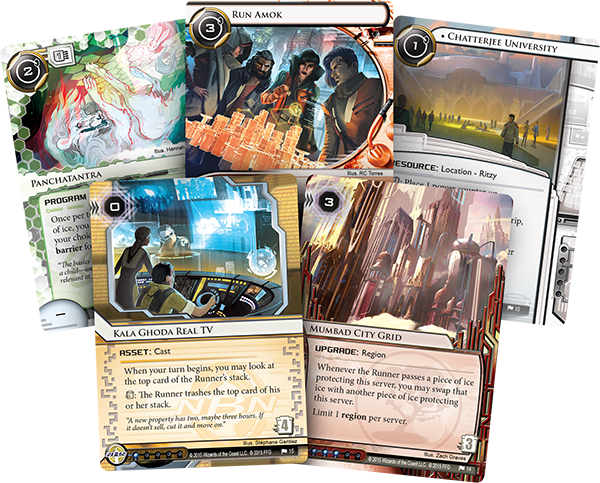We have written a lot about Netrunner, and I am aware that we run the risk of turning into a Netrunner fan site. But the game’s designers at Fantasy Flight Games keep doing fascinating things that deserve notice, whether or not you’re holing up with a playmat and a couple friends to hack on a Friday night (ahem).
The “living card game”—meaning it releases discrete expansions, rather than endless, randomized sets of new cards—has just entered a crucial second act, in which the full design of the original game is now out in the world, and the team behind it is tasked with creating variations therein. So far, that has resulted in some truly bonkers shit, like secret identities, new micro-factions, deck-breaking cards, and other terms that will make no sense unless you’re part of the cult. Still, this has had wonderful ramifications for the game’s greater fiction: I will soon be able to play as both a middle-aged single mother that is secretly a devastating hacker, and a mysterious entity that exists only inside of the internet. This is all good.
clones are attempting to get the rights of full citizenship
Last week, Fantasy Flight Games announced the Mumbad Cycle, and its first part Kala Ghoda, which does something else unprecedented: it takes the game to India. The game has explored discrete places before, but they were, in order, the moon, and then SanSan, an exaggerated take on San Francisco full of trust-fund activists and slick tech-world wheel-greasing. These are interesting places, but not new for cyberpunk. The fictional Mumbad is (probably) a conglomeration of the real cities Mumbai and Ahmedabad, with Kala Ghoda taking the name of Mumbai’s real-world arts district.
With any new expansion, the game’s designers release a few cards, and the ones shown so far for the new pack exhibit the game’s uncommonly deep interaction with IRL culture. In it, India’s caste system has been discarded only to be replaced by a new tiered system of humans and androids; clones are attempting to get the rights of full citizenship, but are being oppressed by the very corporations that made them; hackers and activists are fighting back with programs inspired by Hindu culture, and making home-bases in universities named after real-world Indian mathematicians. The prospect of this team tackling Bollywood is too good to imagine.

Now a couple years after its release, I have no idea if Netrunner counts as the hot-shit of the card-playing universe. I play boardgames with a small group of friends, and we all hate each other’s guts; I cannot speak to “the meta.” But the game remains a fascinatingly intellectual tabletop game, both from the cerebral rewards of grappling with an enormously complex possibility space, and from the designers’ ongoing ability to make you feel like you’re roleplaying the scariest and most exciting insinuations of your Twitter feed. Most games grow ever more insular as they iterate into sequels and expansions; Netrunner instead looks out to the world and asks, “Where can we go next?”
(Thanks to a whole bunch of Redditors for helping me tease out these inspirations, particularly myth_builder.)





